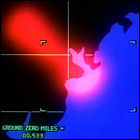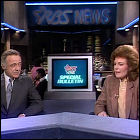 An armed anti-nuclear fringe group docks a rented tugboat at the port in Charleston, South Carolina; at the first sign of a Coast Guard inspection of the boat, fire is exchanged, and a local news crew reporting another story at the port is taken hostage. The terrorists aboard the boat demand that the news crew’s network give them access to the airwaves, or the hostages will be shot. RBN reluctantly allows the terrorists to broadcast their demands across the nation: the U.S. government will either deliver the remote detonation controls for its entire nuclear arsenal to the boat, or a low-yield nuke will be detonated in Charleston. After speculation arises that the demand is a bluff, a real nuclear device is shown on the air, though the government seems slow to respond, other than ordering a “limited” evacuation of Charleston. As RBN profiles the terrorists’ pasts, it becomes apparent that one of them has already contracted radiation poisoning from handling nuclear material…and a man with nothing to lose is the most dangerous man in the world.
An armed anti-nuclear fringe group docks a rented tugboat at the port in Charleston, South Carolina; at the first sign of a Coast Guard inspection of the boat, fire is exchanged, and a local news crew reporting another story at the port is taken hostage. The terrorists aboard the boat demand that the news crew’s network give them access to the airwaves, or the hostages will be shot. RBN reluctantly allows the terrorists to broadcast their demands across the nation: the U.S. government will either deliver the remote detonation controls for its entire nuclear arsenal to the boat, or a low-yield nuke will be detonated in Charleston. After speculation arises that the demand is a bluff, a real nuclear device is shown on the air, though the government seems slow to respond, other than ordering a “limited” evacuation of Charleston. As RBN profiles the terrorists’ pasts, it becomes apparent that one of them has already contracted radiation poisoning from handling nuclear material…and a man with nothing to lose is the most dangerous man in the world.
teleplay by Marshall Herskovitz
story by Edward Zwick & Marshall Herskovitz
directed by Edward Zwick
music by Ferdinand Jay Smith
Cast: Ed Flanders (John Woodley), Kathryn Walker (Susan Myles), Roxanne Hart (Meg Barclay), Christopher Allport (Steven Levitt), David Clennon (Dr. Bruce Lyman), David Rasche (Dr. David McKeeson), Rosalind Cash (Frieda Barton), Ebbe Roe Smith (Jim Seaver), Roberta Maxwell (Diane Silverman), Robert Kay (George Takashima), J. Wesley Huston (Bernard Frost), Frank Dent (Dr. Jason Halpern), Charles Lanyer (Merritt Cunningham), Mie Hunt (Ellen Stevens), Bruce Fields (Walter Letteau), Lane Smith (Morton Sanders), Jim Jansen (Arlen Surrey), Peter Hobbs (Jonathan E. Herman), Mary Armstrong (Interviewee), Bernard Behrens (Dr. Neils Johanssen), Ivan Bonar (Interviewee), Ron Frazier (Interviewee), Bruce Frank (Interviewee), Elizabeth Gill (Interviewee), June Kim (Hiroshima Interviewee), George Morfogen (Interviewee), Duncan Ross (Interviewee), Bill Saito (Hiroshima Interviewee), Kenneth Tigar (Dr. Abraham Sczrsma), John Walsh (Interviewee), Steve Arvin Interviewee(), Edwin Bernstein (Interviewee), Wanda Bowe (Interviewee), Robert Buckingham (Interviewee), Judie Carroll (Interviewee), Marian A. Carter (Interviewee), Kelly Condon (Interviewee), William A. Gimble Jr.
(Interviewee), William J. Ghinta (Interviewee), Liberty Godshall (Interviewee), Ray Godshall (Interviewee), Virginia Gourdin (Interviewee), Steven Ledford (Interviewee), Marc Levy (Interviewee), Michael Madsen (Jimmy Lenox), Robert Marks (Interviewee), Joe Mays (Interviewee), Arthur McDonald Interviewee(), David Moses (Interviewee), Arthur R. Nuzzo (Interviewee), Ellen Ren (Interviewee), Adrian Ricard (Interviewee), Steven M. Sawyer (Interviewee), Sadina H. Terry (Interviewee), Jack Thompson (Tennessee Senator), Celestine Turner (Interviewee), David VandeBrake (Interviewee), Elizabeth Young (Interviewee), Sam Youngblood (Interviewee), Randolph Hille (Politician), John Wesley (Bernard Frost)
LogBook entry and review by Earl Green
Review: Carrying on the tradition of Orson Welles’ infamous 1938 War Of The Worlds radio broadcast, Special Bulletin is a seminal flashpoint in the “faux newscast” sub-genre of American television drama, and in some ways it may still be the best…or at least the scariest. In a post-9/11, post-Columbine world where mass killings on American  soil have become a home-grown commodity rather than the Middle Eastern import so many people seem to want us to believe it is, what’s scary as hell about Special Bulletin is that it’s the most likely scenario to have emerged from this genre. Not because of the political orientation of the terrorists, or their “message”, but because in modern America it’s simply far too plausible to imagine a scenario where domestic terrorists have so little regard for life that they’re willing to set off a weapon of mass destruction in a heavily populated area. These days it seems like “the message” is really better described as “the excuse”. If rioting is the voice of the unheard (or, perhaps more accurately, the un-listened-to), this sort of act is the voice of someone who’s only seeking what they view as a justifiable runway to kill an awful lot of people, and to scare even more people.
soil have become a home-grown commodity rather than the Middle Eastern import so many people seem to want us to believe it is, what’s scary as hell about Special Bulletin is that it’s the most likely scenario to have emerged from this genre. Not because of the political orientation of the terrorists, or their “message”, but because in modern America it’s simply far too plausible to imagine a scenario where domestic terrorists have so little regard for life that they’re willing to set off a weapon of mass destruction in a heavily populated area. These days it seems like “the message” is really better described as “the excuse”. If rioting is the voice of the unheard (or, perhaps more accurately, the un-listened-to), this sort of act is the voice of someone who’s only seeking what they view as a justifiable runway to kill an awful lot of people, and to scare even more people.
But Special Bulletin isn’t just talking about nukes or terrorism. Years before the vapidity of the 24-hour, fill-with-anything-even-if-it’s-unconfirmed cable news cycle was a thing, Special Bulletin – through its own dialogue – rails against talking news heads and guest “experts” prattling on about things of which they know very little, just to fill airtime. We might think of this as a malaise of the modern media age, but it’s an evolution of a problem that already existed in the era of tube  cameras and analog transmitters. It’s well-meaning speculation predating the modern political news strategy of “flooding the zone with shit”, but even so, it doesn’t help.
cameras and analog transmitters. It’s well-meaning speculation predating the modern political news strategy of “flooding the zone with shit”, but even so, it doesn’t help.
The performances are credible, the dialogue only occasionally becomes stilted, and the direction is above average. One thing that all of the “faux newscast” genre falls victim to, either a little or a lot, is asking us to believe that cameras can go anywhere, and that a line-of-sight microwave news truck or a satellite news truck can get a signal out no matter what. The coverage is always just a little bit too smooth. But Special Bulletin doesn’t rely on suspension of disbelief in the abilities of electronic news gathering gear as much as, say, Without Warning does.
And finally, as much-loved as Thirtysomething was in its day, that show really makes me wonder what happened to this Zwick & Herskovitz. Special Bulletin was incredibly daring TV for its era, challenging the viewer to spot the sometimes blurry line between fact and fiction. So much of the output of Special Bulletin‘s creators afterward seemed tame by comparison.
